
Sucre is the de jure capital city of Bolivia, the capital of the Chuquisaca Department and the sixth most populous city in Bolivia. Located in the south-central part of the country, Sucre lies at an elevation of 2,790 m (9,150 ft). This relatively high altitude gives the city a subtropical highland climate with cool temperatures year-round.
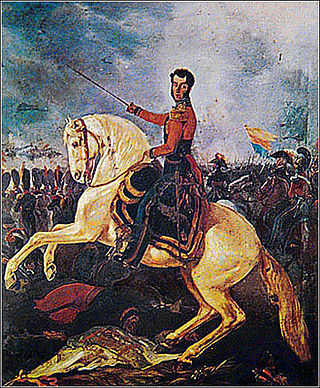
The Bolivian War of Independence began with the establishment of government juntas in Sucre and La Paz, after the Chuquisaca Revolution and La Paz revolution. These Juntas were defeated shortly after, and the cities fell again under Spanish control. The May Revolution of 1810 ousted the viceroy in Buenos Aires, which established its own junta. Buenos Aires sent three large military expeditions to Upper Peru, headed by Juan José Castelli, Manuel Belgrano and José Rondeau, but the royalists ultimately prevailed over each one. However, the conflict grew into a guerrilla war, the War of the Republiquetas, preventing the royalists from strengthening their presence. After Simón Bolívar and Antonio José de Sucre defeated the royalists in northern South America, Sucre led a campaign that was to defeat the royalists in Charcas for good when the last royalist general, Pedro Antonio Olañeta, suffered death and defeat at the hands of his own defected forces at the Battle of Tumusla. Bolivian independence was proclaimed on 6 August 1825.

Juana Azurduy de Padilla was a guerrilla military leader from Chuquisaca, Viceroyalty of the Río de la Plata. She fought for Bolivian and Argentine independence alongside her husband, Manuel Ascencio Padilla, earning the rank of Lieutenant Colonel. She was noted for her strong support for and military leadership of the indigenous people of Upper Peru. Today, she is regarded as an independence hero in both countries.

Mariano Baptista Caserta was a Bolivian politician, orator and journalist. An outstanding intellectual of his time, he was a deputy in various periods, Minister of Foreign Affairs (1873-1876) and (1888-1891), President of Congress (1884-1888), Constitutional President of the Republic (1892-1896) and Vice President of the Republic (1884-1888).
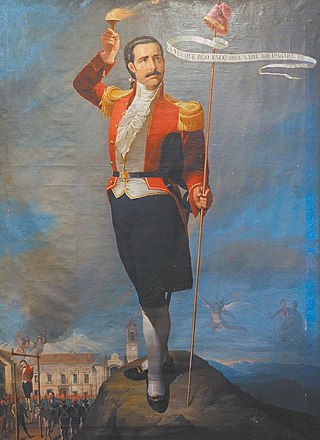
Pedro Domingo Murillo was a patriot of Upper Peru who played a key role in Bolivia's independence.

Mariano Joaquin Boedo born Mariano Joaquin de Boedo y de Aguirre, was an Argentine statesman and soldier. He was a representative to the Congress of Tucumán which on 9 July 1816 declared the Independence of Argentina, signing the Declaration of Independence as a vice president of the Congress.

Severo Fernández Alonso Caballero was a Bolivian lawyer and politician who served as the 24th president of Bolivia from 1896 to 1899 and as the tenth vice president of Bolivia from 1892 to 1896. He is best remembered as the last president of the 15-year period of Conservative Party hegemony (1884–99).
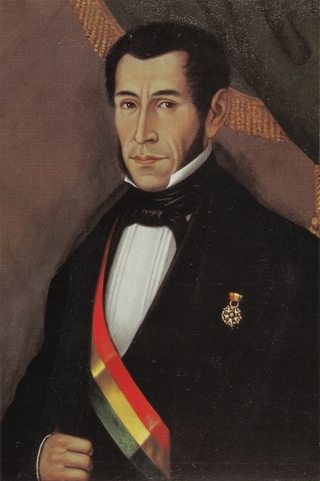
Mariano Enrique Calvo Cuéllar was a Bolivian lawyer, general and politician who served as the de facto eighth president of Bolivia briefly in 1841. He also served as the third vice president from 1835 to 1839 during which he also held the powers of acting president while President Andrés de Santa Cruz was in Peru. He would also be given the rank of general and commander of the Bolivian Army by Santa Cruz.

San Javier is the seat of San Javier Municipality in Ñuflo de Chávez Province, Santa Cruz Department, Bolivia. The mission of San Javier is known as part of the Jesuit Missions of the Chiquitos, declared in 1990 a World Heritage Site, as a former Jesuit Reduction.

Bolivia's independence was definitively proclaimed on 6 August 1825 at a congress held in Chuquisaca.

Universidad Mayor de San Andrés or UMSA is the leading public university in Bolivia, established since 1830 in the city of La Paz. UMSA is the second-oldest university in Bolivia, after the University of San Francisco Xavier de Chuquisaca (1624).
The Chuquisaca Revolution was a popular uprising on 25 May 1809 against the governor and intendant of Chuquisaca, Ramón García León de Pizarro. The Real Audiencia of Charcas, with support from the faculty of University of Saint Francis Xavier, deposed the governor and formed a junta. The revolution is known in Bolivia as the "First Cry of Freedom", meaning the first phase in the Spanish American Wars of Independence. The level of hostility against the Spanish Crown and news from both the American Revolution and the French Revolution has made historians dispute on whether such a description is accurate. However, accounts depict it as being the first step towards liberty in Latin America against the Spanish Crown.
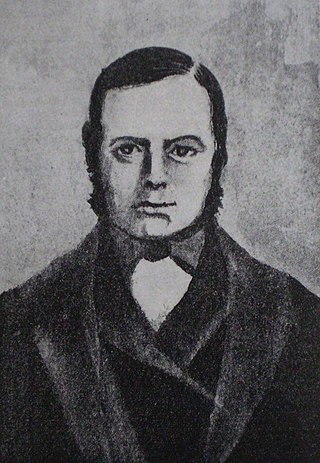
Commandante Manuel Ascencio Padilla was an Upper Peruvian guerrilla chief who fought in the Bolivian War of Independence with his wife, Juana Azurduy de Padilla who shared his commitment towards Bolivian indigenous populations. The town of Padilla, Bolivia is named in his honor.
The Higher University of San Simón is a university in Cochabamba, Bolivia.
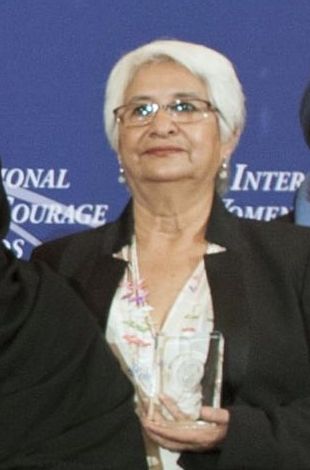
Rosa Julieta Montaño Salvatierra is a Bolivian attorney, human rights defender, woman's rights activist, feminist writer and a 2015 winner of the US State Department's International Women of Courage Award.

Diego Pary Rodríguez is a Bolivian Quechua indigenous leader, educator, politician and diplomat. He served as Advisor to the Bolivian Constituent Assembly of 2006-07 and as Vice Minister of Higher Education. From 2011 to 2018 he served as Ambassador of Bolivia to the Organization of American States (OAS) and Concurrent Ambassador of Bolivia to Trinidad and Tobago, Jamaica, Dominica and The Bahamas. He was Foreign Minister of Bolivia from 2018 until 12 November 2019, following the resignation of Evo Morales.

Yesenia Yarhui Albino is a Bolivian lawyer, politician, and former student leader who served as a party-list member of the Chamber of Deputies from Chuquisaca from 2015 to 2020. An activist forged in the student movement, Yarhui entered politics in 2014 as a candidate on the Christian Democratic Party ballot. Elected in that year's general elections, Yarhui was just 19 years old upon her entry into the Chamber of Deputies, making her the youngest parliamentarian in Bolivian history.

Carlos Aparicio Vedia is a Bolivian diplomat, lawyer, and politician serving as ambassador of Bolivia to Peru since 2021. Aparicio studied law at the University of San Francisco Xavier, during which time he became an adherent of Trotskyist political theory, leading him to join the emerging Movement for Socialism. He served as president of the party's departmental youth wing and participated in its successful 2005 general election campaign. In 2006, he obtained his first elective position, serving as a member of the Constituent Assembly from Chuquisaca, representing circumscription 5 from 2006 to 2007. Two years later, he was elected to represent the same constituency in the Chamber of Deputies, where he served from 2010 to 2015. Following the conclusion of his term, he served as vice minister of public security from 2015 to 2017 and ambassador to Italy from 2018 to 2019.
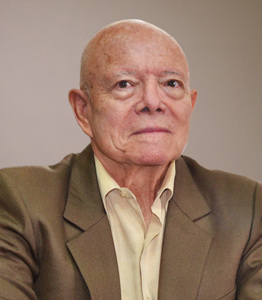
Oscar Abel Hassenteufel Salazar is a Bolivian lawyer and jurist serving as president of the Supreme Electoral Tribunal since 2021. A perennial figure in the Bolivian judiciary, Hassenteufel previously held seats on the now-defunct Supreme Court of Justice from 1993 to 2001 and National Electoral Court from 2001 to 2006, presiding over both bodies from 1999 to 2001 and 2002 to 2006, respectively.


















